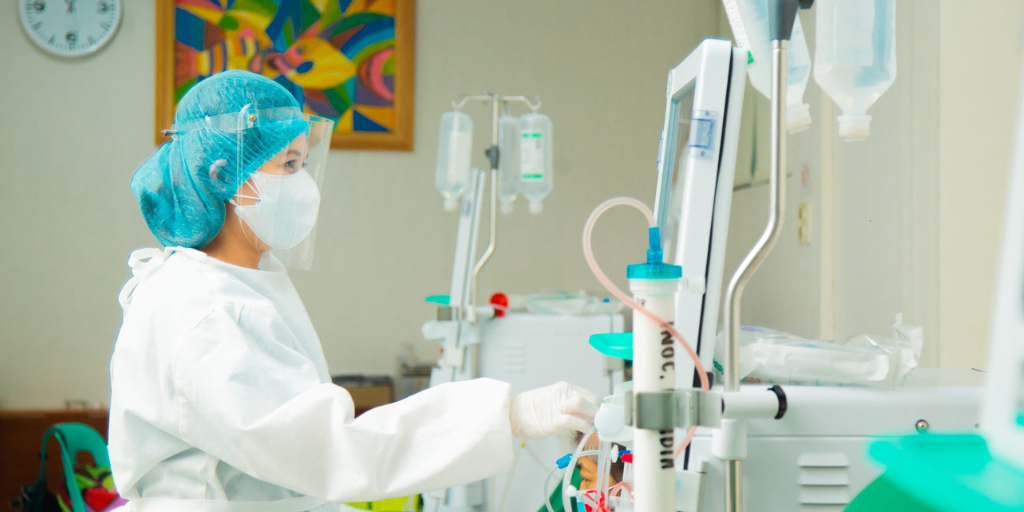Hemodialysis
- +91 90537-79477
- nephrons2024@gmail.com
- Near Tinkoni, GT Road, Bathinda

Hemodialysis: A Lifesaving Treatment for Chronic Kidney Disease
Hemodialysis is a type of dialysis treatment that filters waste products, excess fluid, and electrolytes from your blood when your kidneys are no longer able to perform these functions adequately. For those in need of hemodialysis in Bathinda, this treatment becomes crucial. Chronic kidney disease (CKD) is a gradual loss of kidney function that eventually reaches a stage where dialysis or a kidney transplant becomes necessary for survival. Our specialists in Bathinda provide expert hemodialysis services to support patients with advanced kidney conditions.
How Hemodialysis Works
Hemodialysis mimics the natural filtering process of healthy kidneys. Here’s a breakdown of the process:
- Access: Blood is removed from your body through a specially created access point, typically an arteriovenous fistula (AV fistula) in your arm. An AV fistula is a surgically created connection between an artery and a vein, allowing for easier access to blood flow. In some cases, a central venous catheter, a thin tube placed in a large vein in the chest or neck, may be used for temporary access.
- Dialysis Machine: The blood travels through sterile tubing to a dialysis machine. This machine houses a special filter called a dialyzer, which acts as an artificial kidney.
- Dialysis Solution: Inside the dialyzer, the blood flows through a thin membrane surrounded by a dialysis solution. This solution contains electrolytes and other components balanced to remove waste products and excess fluid from your blood while keeping essential components like blood cells and proteins in your bloodstream.
- Cleaned Blood: The filtered blood, free of waste products and excess fluid, then returns to your body through another sterile tube connected to the access point.
For effective hemodialysis in Bathinda, our facilities provide comprehensive care to ensure optimal treatment and support.
Hemodialysis Treatment Schedule:
Hemodialysis treatments are typically performed three times per week for 3-4 hours each session. The specific schedule and duration may be adjusted based on your individual needs and the severity of your kidney disease.
Benefits of Hemodialysis:
Hemodialysis is a life-saving treatment for people with advanced chronic kidney disease. It helps to:
- Remove waste products and toxins: These build up in the blood when your kidneys are not functioning properly and can be harmful if left unmanaged.
- Maintain a safe balance of electrolytes: Electrolytes are minerals in your blood that help regulate muscle function, nerve impulses, and hydration. Dialysis helps maintain proper electrolyte levels.
- Control blood pressure: High blood pressure is common in CKD, and hemodialysis can help regulate it.
- Improve overall health and quality of life: By managing waste products and fluid balance, hemodialysis allows individuals with advanced CKD to feel better and participate more actively in daily life.
Potential Side Effects of Hemodialysis:
Hemodialysis is a generally well-tolerated treatment, but some common side effects can occur:
- Low blood pressure: This can happen during or after dialysis due to removal of excess fluid.
- Muscle cramps: Dialysis can affect electrolyte levels, leading to muscle cramps.
- Fatigue: Feeling tired after dialysis sessions is common.
- Itchiness: This can be a side effect of dialysis or medications used during the treatment.
- Access site problems: There can be issues with blood clots or infections at the access point.
Who is a Candidate for Hemodialysis?
Hemodialysis is typically recommended for individuals with advanced chronic kidney disease when their kidney function has significantly declined and can no longer adequately remove waste products and excess fluid from the body. A nephrologist will assess your individual situation and medical history to determine if hemodialysis is the right treatment option for you.